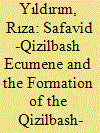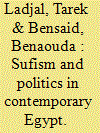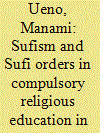|
|
|
Sort Order |
|
|
|
Items / Page
|
|
|
|
|
|
|
| Srl | Item |
| 1 |
ID:
168974


|
|
|
|
|
| Summary/Abstract |
Alevis, the largest religious minority of Turkey, also living in Europe and the Balkans, are distinguished from both Sunnis and Shiʿites by their latitudinarian attitude toward Islamic Law. Conceptualizing this feature as “heterodoxy,” earlier Turkish scholarship sought the roots of Alevi religiosity in Turkish traditions which traced back to Central Asia, on the one hand, and in medieval Anatolian Sufi orders such as the Yasawi, Bektashi, Qalandari, and Wafaʾi, on the other. A new line of scholarship has critiqued the earlier conceptualization of Alevis as “heterodox” as well as the assumption of Central Asian connections. In the meantime, the new scholarship too has focused on medieval Anatolian Sufi orders, especially the Bektashi and Wafaʾi, as the fountainhead of Alevi tradition. Critically engaging with both scholarships, this paper argues that it was the Safavid-Qizilbash movement in Anatolia, Azerbaijan, and Iran rather than medieval Sufi orders, that gave birth to Alevi religiosity.
|
|
|
|
|
|
|
|
|
|
|
|
|
|
|
|
| 2 |
ID:
140121


|
|
|
|
|
| Summary/Abstract |
Experts on Sufi movements relegate a rather significant and critical role for Sufism in the formation of redefined political forces on the new post-Arab Spring political map. This is particularly true for one of the most vibrant Sufi capitals of the Muslim world, Egypt, holding a record sum of more than 10 million Sufi members. In spite of this, however, one year after the Revolution in Egypt, political developments exhibited a pattern of failure of Sufis gaining political ground in the post-Mubarak political arena. This paper discusses contentions and problematic issues Sufis faced with respect to politics in Egypt, with particular focus given to their political experience in Egypt. This study seeks to explore the Sufi experience throughout the process of political struggle, while examining their contributions to the November 2011 elections in an attempt to unveil the factors culminating in their political setback in spite of their massive membership base, and the official favored support of the state, both on the local and international fronts. The study concludes that the nature of the Sufi practice itself contributed to a restraining of their political presence, in addition to their lack of political awareness, poor organization and populism, all of which acted critically toward creating a failed political journey for the Sufi orders in modern Egypt.
|
|
|
|
|
|
|
|
|
|
|
|
|
|
|
|
| 3 |
ID:
159335


|
|
|
|
|
| Summary/Abstract |
The governments of the Turkish Republic have claimed the authority to decide what kind of Islam is or is not desirable for Turkish citizens. This article explores how the governments after the 1980 coup infiltrated the negative image of Sufi orders into compulsory religious education and how the Justice and Development Party regime has been trying to modify it. To do so, it investigates the descriptions of Sufi orders as well as Sufism in the textbooks studied as part of the mandatory Religious Culture and Morals course from the beginning of 1982 to present.
|
|
|
|
|
|
|
|
|
|
|
|
|
|
|
|
|
|
|
|
|